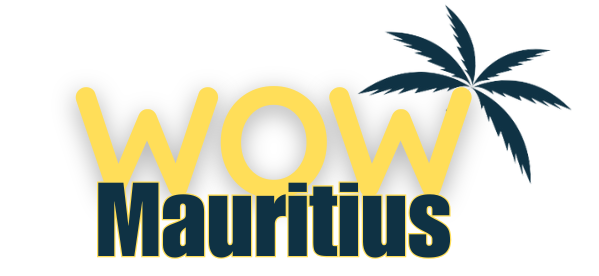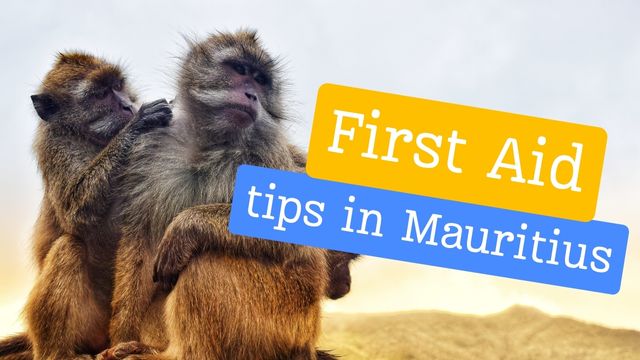Mauritius is widely known as a dream travel destination, with its turquoise lagoons, lush mountains and warm hospitality. It’s also a safe place to visit — but like any tropical island, unexpected things can happen. A jellyfish sting, a sea urchin spine, or even a minor dog bite can turn into a stressful experience if you’re unprepared. This guide will walk you through the most important steps of first aid in Mauritius, so that you know what to do and who to call, just in case.
What to do if a monkey bites you – and how to behave around them
You’ll most likely encounter wild monkeys (macaques) in places like Black River Gorges National Park or other nature-rich lookout points. They may look cute or curious, but it’s best not to feed them, approach them too closely or stare into their eyes, as they may perceive it as a threat.
In the rare event that a monkey bites you, immediately wash the wound thoroughly with soap and running water for at least 15 minutes. Then disinfect the area and seek medical attention — even if the wound seems superficial. Although first aid in Mauritius rarely involves animal bites, a tetanus shot or wound cleaning by professionals may still be necessary.
Street dogs in Mauritius – how to act and what to avoid
There are many stray dogs in Mauritius, especially in rural villages or remote coastal areas. Most are not aggressive, but they can be unpredictable. Never try to pet, feed or approach them, and avoid making sudden movements or loud noises.
If a dog growls or approaches you, stay calm, do not run, and slowly walk away without turning your back. Even though Mauritius is officially a rabies-free country, any bite or scratch should be checked by a medical professional as part of first aid in Mauritius best practices.
Should you worry about rabies in Mauritius?
Mauritius has been classified as rabies-free for many years, which means the risk of rabies from dogs or monkeys is essentially non-existent. This makes first aid in Mauritius more straightforward than in many other tropical destinations. That said, wound care and tetanus protection are still important. In any case involving animal bites, consult a local doctor or clinic.
What to do if you step on a sea urchin
Some beaches in Mauritius have natural rocky or coral areas where sea urchins may be found. Stepping on one is painful, and the spines can lodge deeply into your skin. The first step in first aid in Mauritius for this type of injury is to soak the affected area in hot water (38–45°C) for 30 to 90 minutes. This reduces pain and helps to denature the venom.
Do not try to dig out deep spines yourself — this may cause more damage or infection. A mild acid like vinegar or lemon juice may help dissolve the spines if they are shallow, but if pain, swelling or redness persists, visit a doctor for proper removal and care.
Jellyfish stings – what to do, and what NOT to do
Jellyfish do appear in Mauritian waters from time to time, especially in the summer months. Their sting is not usually life-threatening, but can cause burning pain and long-lasting discomfort. Based on personal experience, soaking the affected area in hot water (38–40°C) can significantly reduce the pain and inflammation.
Avoid rinsing the area with fresh water, as it can cause remaining stingers to release more venom. Remove any tentacle fragments using tweezers, a glove, or the edge of a bank card. Contrary to popular belief, urinating on a jellyfish sting can make things worse — it may aggravate the skin and intensify pain. Vinegar may help with certain species, like box jellyfish, but is not universally effective and can sometimes irritate the skin further. If you notice symptoms like difficulty breathing, dizziness, or swelling, seek medical help immediately.
Where to go for medical help in Mauritius
First aid in Mauritius is readily available thanks to a network of public hospitals and private clinics. If you suffer an injury or reaction that needs attention beyond basic care, these are your options:
Public hospitals (free, but often busy):
- Dr A.G. Jeetoo Hospital – Port Louis
- SSRN Hospital – Pamplemousses
- Victoria Hospital – Candos
Private clinics (faster, but you’ll pay unless insured):
- C-Care – located in several locations across the country
- Cliniques – Click here for a further list
Both private hospitals offer 24/7 emergency care and accept international travel insurance. If you don’t have insurance, be prepared to pay upfront in cash or by card.
Who to call in case of an emergency
If you find yourself in a serious situation — allergic reaction, animal attack, accident, or getting lost during a hike — call one of the emergency numbers below:
| Service | Phone Number |
|---|---|
| Ambulance (SAMU) | 114 |
| Police | 999 or 112 |
| Fire Department | 115 or 995 |
| Coast Guard / Sea Rescue | 177 |
| Tourist Info Helpline | 152 |
| Private ambulance (Wellkin) | 132 |
| Private emergency (Darné) | 118 |
You can dial 112 from a mobile phone in most locations, even without signal from your primary provider.
What to do if you get lost or injured during a hike
Mauritius has breathtaking trails and mountainous areas, but dense vegetation and inconsistent signage can make it easy to lose your way. Always research your route in advance, bring an offline map, and carry water and a fully charged phone.
If you get injured or lost and still have phone service, call the police (999 or 112). If you’re inside a national park, the National Parks and Conservation Service can assist with locating and rescuing hikers. Their number is +230 464 4053. For coastal or ocean-related emergencies, contact the Coast Guard at 177.
As part of first aid in Mauritius preparedness, it’s wise to tell someone where you’re going and when you plan to return, especially if you’re hiking alone.
While accidents are rare, knowing the basics of first aid in Mauritius can give you peace of mind and make your trip even more enjoyable. Whether you’re exploring coral reefs, hiking rainforest trails or relaxing on a beach, being informed means being prepared. Respect the local environment and wildlife, and they’ll reward you with unforgettable memories — not medical bills.



